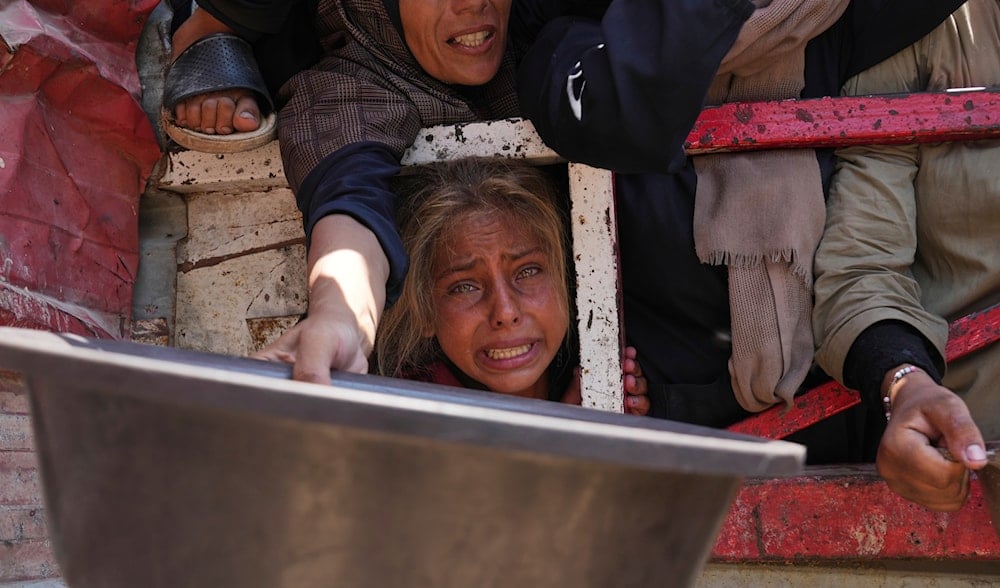UK pushes Gaza aid airdrop operations, despite previous disasters
British Prime Minister Keir Starmer announces a Gaza humanitarian airdrop plan and child evacuation efforts, as the UK, France, and Germany face criticism for supporting "Israel" militarily.
-

Palestinians struggle to get donated food at a community kitchen, in Gaza City, northern Gaza Strip, Saturday, July 26, 2025. (AP Photo/Abdel Kareem Hana)
British Prime Minister Keir Starmer has announced plans to advance humanitarian aid efforts for Gaza, including an airdrop operation and medical evacuations for children.
The initiative, coordinated with international partners, comes amid mounting concerns over starvation and the humanitarian toll of the ongoing Israeli genocide in Gaza.
In a statement released Saturday, Starmer's office said the UK is “taking forward plans to work with partners such as Jordan to airdrop aid and evacuate children requiring medical assistance.”
Read more: UK faces legal action for denying Gaza children medical evacuation
It is worth noting that airdrop operations were previously tested and failed, causing the deaths of tens of Palestinian civilians seeking aid. At the time, the United Nations asserted that delivering humanitarian supplies to Gaza by airdrops or sea cannot sufficiently substitute land deliveries.
A report by the Wall Street Journal also stressed that aid deliveries by plane are insufficient and dangerous, quoting relief groups saying that only large-scale truck deliveries can prevent famine.
These airdrop initiatives, while framed as humanitarian, dangerously whitewash the roles of regimes allied to the Israelis, like Jordan and the UAE, by portraying them as benevolent actors despite their complicity or silence in the face of genocide.
In reality, they serve as a public relations cover to deflect international scrutiny and, in the case of Jordan, to calm unprecedented internal unrest fueled by public outrage over the massacre in Gaza.
Such operations have a deadly track record, having previously killed Palestinian civilians scrambling for aid, and are widely condemned by relief organizations as ineffective and symbolic gestures that cannot replace the safe, sustained flow of aid through land crossings.
Starmer calls up partners
Starmer subsequently held a joint phone call with French President Emmanuel Macron and German Chancellor Friedrich Merz to address the worsening humanitarian situation. According to a Downing Street readout, the leaders "agreed it would be vital to ensure robust plans are in place to turn an urgently needed ceasefire into lasting peace."
During the conversation, the three leaders reaffirmed their shared commitment to a long-term political solution. “They discussed their intention to work closely together on a plan... which would pave the way to a long-term solution and security in the region,” the statement said. The plan would eventually include “key partners, including in the region,” to further regional coordination.
It is noteworthy that the UK, alongside Germany and France, has faced criticism for its ongoing military support to "Israel." Human rights organizations and analysts have pointed to continued arms sales, intelligence sharing, and diplomatic backing that have enabled "Israel’s" war campaign against Palestinians in Gaza.
While London, Berlin, and Paris now call for aid corridors and ceasefires, they have simultaneously approved weapons exports and defense cooperation agreements with the Israeli government, undermining their stated commitment to peace and humanitarian principles.
A day prior, UN Secretary-General Antonio Guterres described the global response to the Gaza starvation crisis as a “moral crisis that challenges the global conscience.” His remarks have amplified pressure on international actors to respond more decisively.
Read more: Independent: Time for UK to recognize Palestine, says MP Thornberry

 3 Min Read
3 Min Read








